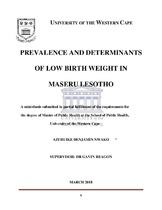| dc.description.abstract | INTRODUCTION: Low birth weight (LBW), affecting about 30 million newborns annually, is the
commonest cause of severe morbidity and mortality amongst neonates globally, and is
implicated in a high proportion of stillbirths. Neonatal deaths of LBW babies are mainly due to
infection, prematurity and respiratory distress. Many factors affect LBW including maternal
factors such as age, pregnancy associated factors such as illness in pregnancy, socio-economic
factors such as housing type and foetal factors such as multiple gestations. In 2009, a national
survey estimated that the prevalence of LBW was at 9.5% in Lesotho, based on a combination of
actual birth weight measurements and birth weight estimations provided by the respondents.
Given the high probability of non-differential misclassification arising in the national study, the
prevalence of LBW arrived at was in doubt and only a limited number of factors potentially
affecting LBW were assessed. | |

